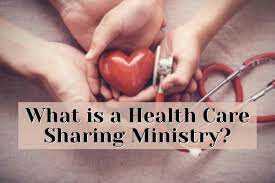Introduction
Non-insurance organisations known as health care sharing ministries are groups whose membership "share a shared set of ethical or religious views and divide medical expenses among members in accordance with those beliefs."
What Are Health Care Sharing Ministries (HCSMs)? Some people might find value in HCSMs and consider them an alternative to coverage under the Affordable Care Act. Customers who do not qualify for marketplace subsidies can benefit greatly from HCSM's lower beginning costs. However, there are dangers involved with these arrangements. Members who do not comprehend what they are acquiring and discover that their coverage is insufficient to pay for their needs may experience unanticipated consequences due to these plans. Suppose HCSMs and other alternative coverage choices undercut the risk pool. In that case, consumers in the market for insurance that conforms with the Affordable Care Act will see higher prices and fewer plan selections.

How Health Care Sharing Ministries Work
The monthly dues members of health care sharing ministries (HCSMs) pay are used to support other members' medical bills. Most HCSMs consist of affiliated membership organizations that share moral or spiritual beliefs. Simply put, members make regular contributions that are analogous to insurance premiums. The money from those payments is utilized to cover the medical needs of other persons active in the ministry. The following are some of the more renowned healthcare sharing ministries:
The following organizations: Trinity HealthShare Inc., Medical Ministries of Christian Faith, Medi-Share, Samaritan Ministries, United Refuah HealthShare, Liberty HealthShare, MCS Medical Cost Sharing, Altrua HealthShare, Freedom HealthShare, and Ministry of General Health Care is not an insurance company.
Non-insurance organizations are referred to as health care sharing ministries. They are 501(c)(3) non-profit organizations that raise funds for the benefit of their members who have difficulty meeting their medical expense obligations.
Can you use an HRA with a Medishare?
Due to limitations set forth by the IRS, the membership fees levied by healthcare sharing ministries are ineligible for reimbursement through HRAs such as the qualified small employer HRA (QSEHRA) (QSEHRA). That is because Section 213 of the United States Internal Revenue Code dictates which an HRA can reimburse medical costs and health insurance premiums.
The benefit of healthcare sharing ministry programs is not technically insurance because a health insurance provider does not offer them. According to the standards of the IRS, it is not feasible to be repaid for membership fees or donations. Nevertheless, workers may still be able to get reimbursements for other forms of qualified medical expenses, provided the employer has a solid reimbursement program. For instance, one does not need health insurance to join a QSEHRA. Employees can use their HRA funds to cover copays and deductibles like prescription medicines, counseling, and over-the-counter meds. Signing up is open year-round, as was previously mentioned. The good news is that members have no waiting period to join health care sharing organizations
Benefits of Health Care Sharing Ministries
If you compare HCSM to the cost of standard medical insurance, you may find that your monthly payments are lower. You are excluded from the requirements that you pay for typical medical insurance, which covers preventative care, preexisting conditions, and reproductive care. There are no deductibles for HCSMs for either individuals or families. Expenses covered by the insurance company are subject to deductibles, which the policyholder must pay out of pocket. When you have an HCSM, you are responsible for paying what is known as an annual unshared amount.
Pros
However, in some cases, the full-price monthly premiums for individual major medical coverage may be lower than the amount members pay each month. Because of this, the premiums for HCSMs are generally more affordable for people who do not qualify for premium subsidies under the Affordable Care Act.
From 2014 to 2018, HCSM participants were free from the individual mandate penalty under the Affordable Care Act (ACA). That is very different from most alternatives considered replacements for ACA-compliant coverage. Suppose you do not qualify for premium subsidies under the Affordable Care Act and are at risk of going without health insurance. In that case, the coverage provided by HCSM is better than having no health insurance.
Cons
The ACA does not govern HCSMs in any way. Your level of protection may vary from one HCSM to the next, and you shouldn't count on key health benefits like deductible and copayment sharing being included. They are still able to establish yearly and lifetime benefit caps, though.

Conclusion
Health care sharing ministries, often known as HCSMs, are not insurance companies but rather cost-sharing groups to support members in lowering their medical bills. People of comparable religious or ethical values, most typically Christianity, are welcome to join the organization. Healthcare shared savings plans (HCSMs) are divisive since they are not obligated to provide health insurance or pay for medical expenses (ACA).









